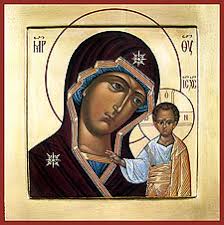 The Virgin Mary…?
The Virgin Mary…?
Those of you who were raised Orthodox or Roman Catholic cannot imagine how hard it was for most of us former Protestants to accept the Mother of God. I know, because when we try to describe it, you just look at us with puzzled looks on your faces!
Most icons with permission of Saint Isaac’s Skete at skete.com (except as noted)
For most Protestants Mary is tabu. There’s no other word for it. She is just unacceptable, forbidden for reasons that cannot be explained.
In Protestant denominations she is almost entirely ignored. She appears in Christmas “creches”, but that’s about it. When I was a boy the only reason I was given for this was because “that’s what Catholics do”. (“Catholics” also believe in Jesus, but I don’t remember anybody taking the argument that far!)
At the Methodist seminary I attended in the early ’60s, her Virgin Birth was mentioned only rarely – in some theology and Bible classes. (In other classes professors demonstrated to us that it was not true. *) The rest of the time she received no attention whatever. Certainly not in worship services.
- The present dean of Union Theological Seminary, one of the most prominent liberal Protestant seminaries, says the Virgin Birth is a “bizarre claim”. See https://www.nytimes.com/2019/04/20/opinion/sunday/christian-easter-serene-jones.html – if you care to.
I was blessed to be introduced to the Virgin Mary when I joined an Episcopalian Anglo-Catholic parish. But even then I was in no way prepared for what I heard when I first attended an English-language Divine Liturgy at an Orthodox Church.
The Mother of God seemed to be mentioned every few minutes: “Calling to 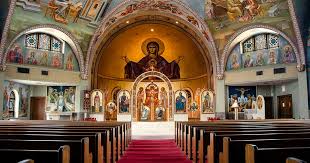 remembrance our all-holy, immaculate, most blessed and glorious Lady the Theotokos and ever-virgin Mary, with all the saints…” And soon afterwards came “Calling to remembrance our all-holy, immaculate, most blessed and glorious Lady the Theotokos and ever-virgin Mary, with all the saints…” (but didn’t they just do that?) – followed by the same thing again! Soon after that it was “Through the prayers of the Theotokos, O Savior, save us” three times. * And so on.
remembrance our all-holy, immaculate, most blessed and glorious Lady the Theotokos and ever-virgin Mary, with all the saints…” And soon afterwards came “Calling to remembrance our all-holy, immaculate, most blessed and glorious Lady the Theotokos and ever-virgin Mary, with all the saints…” (but didn’t they just do that?) – followed by the same thing again! Soon after that it was “Through the prayers of the Theotokos, O Savior, save us” three times. * And so on.
- Visitors to Orthodox churches hear all this because they come on time.
There’s more: On Lenten Fridays we sing an “Akathist Hymn” to the Theotokos, where we praise her for about 45 minutes straight. Likewise a similar Paraklysis service to her during the Dormition Fast. * I know a Lutheran couple who were inquiring about Orthodoxy and wanted to get a sample of our worship. So they went to a local Milwaukee church and as they approached the priest, trying to be friendly and helpful, met them outside and said, “Come on in. We’re about to sing a service to the Virgin Mary.” They turned around and fled! They, by the way, are now Orthodox – he a priest, one of their daughters a nun.
- No matter what I do, my “spell check” is determined (at the last second, while I’m not watching) to turn “Paraklysis” into “Paralysis”, and “Dormition” into “Formation”! If these mistakes creep in, please let me know.
Why do even thoughtful Protestants reject devotion to the Virgin Mary? Often the contention, whether spoken or unspoken, is that it is not Scriptural. Wrong! Wrong! WRONG! as we will demonstrate below.
But before that, three things:
1 I’ll take the New Testament text as written. There’s no assured way to get behind it to find the “real thing”, as some imaginative souls try to do. Of course, most of our popular English texts are already “twice-translated” – Greek to Latin to English, and with Matthew perhaps “thrice-translated”, first out of Aramaic, the language Christ spoke. Linguistic scholars, if you have comments or corrections to add, please do so in the Comments below.
2 “Because the Bible Says So” (above) was only a come-on, so to speak, because the Bible says nothing. Jesus Christ is the Word of God. He is the One who speaks. The Holy Scriptures are the Church’s first written witness to him. They have never stood alone, “Sola Scriptura”. Their words have to be understood, interpreted, in one way or another. By Arius or by Luther or… or …. Or as they were delivered to us by the Apostles as part of the Christian Way, the Tradition, we Orthodox call it. This Tradition existed before the New Testament was written, and it is within that continuing Tradition that the Scriptures can still be rightly understood. So that is how the Apostle wrote the New Testament. That is how the Church understands it. That is what I will try to follow here.
3 For something to be considered “Scriptural”, the precise wording need not be in the Bible. For example, the term “Trinity” is nowhere in the Bible. Yet I think most Biblically-minded Protestants accept it because it accurately sums up what the New Testament teaches.
The Theotokos in the New Testament
Let’s begin like this:
Q. How often is Mary mentioned in the Gospels? A. She is all over the place. Other than Jesus Christ himself, who is mentioned most often in the Gospels? His Mother Mary.
Let’s just list the passages here. In the next section we’ll look at their meaning.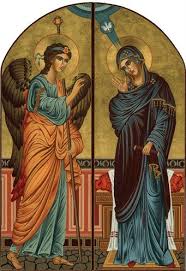
1 Her Annunciation by the Archangel Gabriel and his words: “Hail, full of grace. The Lord is with you.” Luke 1:26-38
2 Her visit to her cousin Elizabeth, which includes 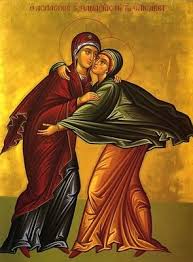 Elizabeth’s greeting: “Blessed are you among women, and blessed is the fruit of your womb.” And the Song of Mary which is sung daily at services in both Eastern and Western Christianity: “My soul magnifies the Lord… all generations shall call me blessed.” Luke 1:39-56
Elizabeth’s greeting: “Blessed are you among women, and blessed is the fruit of your womb.” And the Song of Mary which is sung daily at services in both Eastern and Western Christianity: “My soul magnifies the Lord… all generations shall call me blessed.” Luke 1:39-56
3 Her Virginal Conception, Joseph’s angelic visitations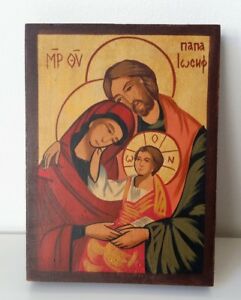 , Jesus’ birth. Matthew 1:18-2:23
, Jesus’ birth. Matthew 1:18-2:23
4 Joseph leads her to Bethlehem, Jesus’ birth, the visit of the shepherds. Luke 2:1-21
Let’s stop and look at the Nativity icon below, because it’s so interesting. It tells the entire story of the Birth of Jesus Christ.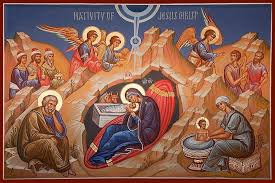 In the center in the cave (not a “stable”) are Christ and his Virgin Mother, with the animals. Far above in the center is the Holy Spirit of God presiding over it all. Left above are the Wise Men approaching. Above are the angels, including one instructing the shepherds, right, to go to Bethlehem. Left below is Joseph, feeling “out of it”. Right below is the newborn Baby Jesus being washed up by a midwife. The impossible shapes of the hills tell us that something super-natural is happening here: God in Person “was incarnate of the Holy Spirit and the Virgin Mary, and was made Man.”
In the center in the cave (not a “stable”) are Christ and his Virgin Mother, with the animals. Far above in the center is the Holy Spirit of God presiding over it all. Left above are the Wise Men approaching. Above are the angels, including one instructing the shepherds, right, to go to Bethlehem. Left below is Joseph, feeling “out of it”. Right below is the newborn Baby Jesus being washed up by a midwife. The impossible shapes of the hills tell us that something super-natural is happening here: God in Person “was incarnate of the Holy Spirit and the Virgin Mary, and was made Man.”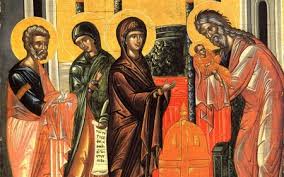
5 The visit of the Magi who found “the Child and his Mother Mary”. Matthew 2:1-12
6 The Presentation of Christ in the Temple, and Simeon’s prophecy to Mary that “a sword shall pierce your heart.” Luke 2:22-39
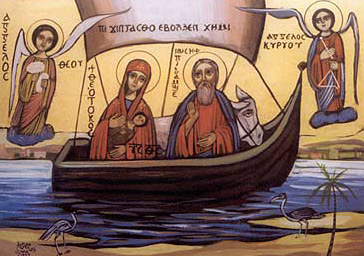 7 Joseph guides “the Child and his Mother” into exile in Egypt, then returns them to Nazareth. Matthew 2:13-23 This is a Coptic (Egyptian) Orthodox icon of the Holy Family on the River Nile.
7 Joseph guides “the Child and his Mother” into exile in Egypt, then returns them to Nazareth. Matthew 2:13-23 This is a Coptic (Egyptian) Orthodox icon of the Holy Family on the River Nile.
8 Mary “pondered these things and treasured them in her heart”. Luke 2:19, 51
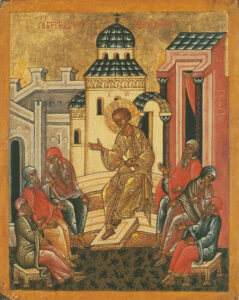 9 At the Passover in Jerusalem the boy Jesus ran away, and when they found him in the temple right his Mother scolded him – God Incarnate! Luke 2:41-51
9 At the Passover in Jerusalem the boy Jesus ran away, and when they found him in the temple right his Mother scolded him – God Incarnate! Luke 2:41-51
10 The wedding at Cana of Galilee below where she pushed Jesus into changing water into wine. Note Mary whispering to her Son. John 1:1-12

11 The people of Nazareth reject Jesus, thinking he could not be Messiah because he had grown up there; they knew “his mother Mary” and the rest of his family. Matthew 13:53-48
12 She and his brothers went to see if he was alright, and he was told, “Your mother and your brothers are here.” Matthew 12:46-50
13 As she stood beneath the Cross with John, 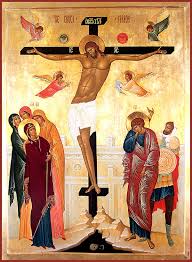 Christ said to her, “Mother, behold your son”, and to John, “Son, behold your mother.” John 19:26-27
Christ said to her, “Mother, behold your son”, and to John, “Son, behold your mother.” John 19:26-27
Proceeding beyond the Gospels:
14 “The women along with his mother Mary and his brothers” were part of the earliest Church. Acts 1:14
15 The Mother of God has been glorified in heaven, of which we’ll say a lot more later. Revelation 12
Have I missed anything?
Is the point made?
How can those who read the Gospels not see Mary? How can anyone who loves Jesus not love his Mother? I don’t understand.
What does the New Testament teach about Mary?
First, let’s be clear that the Church believes a lot more about her that what we’ll speak of here. Some of this (for example the names of her parents, Joachim and Anne) is found in very early books not included in the Scriptures. Other parts are based on our experience with her over the centuries. Father Alexander Schmemann wrote a little book called The Presence of Mary. His point was that if you hang around the Church for a while, you’ll just know that she is here. What the New Testament says about her has been “amplified” and developed in the Church over the centuries.
However, for our purposes now, we’ll stick closely to passages from the New Testament.
1 The stories of the Annunciation, the trip to Bethlehem, the birth of the Lord, the visit of the shepherds and more – where did these come from? I’ll add some italics here for emphasis: In Luke’s was project “to write… an orderly account, most excellent Theophilus [whoever that may be], that you may know the certainty of those things in which you were instructed… just as those who from the beginning were eyewitnesses and ministers of the word delivered them to us.”
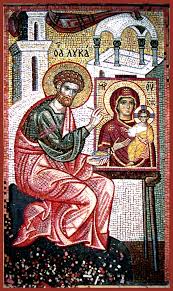 Who was the foremost of these “eyewitnesses”? Luke could not be clearer. He tells us twice so we can’t miss his point. Only one person was there “from the beginning“, and who had “kept all these things and pondered them in her heart ” Luke 2:19, had “kept all these things in her heart”. Luke 2:51 The stories came from the Virgin Mary. (This is so obvious. I am amazed that so few commentators remark on it. I am amazed that it took me so long to see it.) Who else could some of the stories have come from? I mean, how many people were present at the Annunciation?
Who was the foremost of these “eyewitnesses”? Luke could not be clearer. He tells us twice so we can’t miss his point. Only one person was there “from the beginning“, and who had “kept all these things and pondered them in her heart ” Luke 2:19, had “kept all these things in her heart”. Luke 2:51 The stories came from the Virgin Mary. (This is so obvious. I am amazed that so few commentators remark on it. I am amazed that it took me so long to see it.) Who else could some of the stories have come from? I mean, how many people were present at the Annunciation?
There is an old tradition that when Luke “interviewed” Mary in her old age, he painted the first icons of her – which explains why depictions of her from earliest times have been virtually identical. Only in modern times have “creative” artists tried to depict what they imagine she should have looked like.
2 Should we praise Mary? Should we “address” her personally? Is that Scriptural? Yes. “All generations will call me blessed.” Read these words in context. Elizabeth has just “called” her blessed, right to her face: “How is it that the Mother of my Lord should come to me?… Blessed are you among women”. Mary surely means that all generations will do exactly what Elizabeth had just done: Say the same thing to her, address her, tell her, “call me blessed”. Dear Mary, Mother of my Lord, “Blessed are you among women.” *
* A side issue which troubles some: Are people “alive” after death, before the General Resurrection, so we can “talk” to them? Revelation 5:8 describes 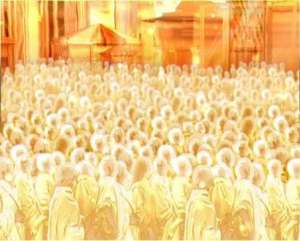 the “saints” now praying in heaven. However, this wasn’t a big issue when most of the New Testament was written, since not many Christians had died yet.
the “saints” now praying in heaven. However, this wasn’t a big issue when most of the New Testament was written, since not many Christians had died yet.
However, the Church’s post-New Testament reflection on the work of Jesus Christ has provided the answer. Jesus Christ has united heaven and earth in himself and broken down the walls between this world and the next. His Church is a family that encompasses both heaven and earth. We ask the prayers and help of loved ones and holy ones on the this side of death. Why ever should we not do the same of those on the other side? For Jesus Christ has conquered death, and death has no more power. Furthermore, our “balanced” Orthodox experience with the saints over the years has not turned us away from God. It has led us to love God more.
Be careful here: Don’t take the “spiritualist” route, trying to summon up the dead for a private consultation unrelated to God. That’s dangerous, not because it’s impossible but because you never know what you’re getting: your departed Aunt Hattie or someone or something pretending to be Aunt Hattie.
The digression is over. Now back to the subject.
3 Is the “Hail Mary” Scriptural? – whether Eastern or Western form? Yes. Most of it is a collation of the words of Gabriel and the words of Mary’s cousin Elizabeth. If it’s good enough for an Archangel and a Saint, it should be good enough for us,
Rejoice, O Virgin Theotokos, Mary full of grace, the Lord is with You. Blessed are You among women, and blessed is the fruit of Your womb, for You have borne the Savior of our souls.
4 The title “Theotokos” – θeoˈtokos, “Birth-giver of God”, “Mother of God”. * Is that Scriptural? Yes. The word itself is not in the Bible, but (like the word “Trinity”) the reality of it certainly is. For the Virgin Mary carried, gave birth to and is Mother of Jesus who is God, God Incarnate. The title was adopted by the Fourth Ecumenical Council to counter 1) any who still disbelieved in the divinity of Christ, and 2) those who said Jesus Christ was not a single Person, both God and Man indivisibly united, so that Mary had somehow inexplicably given birth only to the human side of Christ.
- By which we do not mean she is the eternal Mother of the eternal God. That would be absurd.
Oh, here we go again: I intended this to be a single article, but I’ve got so caught up talking about the Theotokos that we’re going to have to stop now and finish next week. We’ll pick it up with “Does the Bible teach that Mary is Mother of Christians?” (The answer, of course, will be Yes.)
Next Week: Part Two of Why do we honor Mary? Because the Bible says so!
Week after next: from the sublime to the dreadful, inspired by a bunch of recent mass shootings, and there will likely be more in the next two weeks – Guns in Church?

One thing about Mary that I’d never really contemplated before is that she provided the flesh and blood of Jesus. Biologically, that’s obvious, but I think we tend to supernaturalize the whole process and subconsciously imagine the baby Jesus forming in some kind of bubble within Mary’s womb so that He has His own “God-Flesh” distinct from Mary’s flesh. If that were true, then Jesus really wouldn’t have been one of us. When you look at Jesus, you’re also seeing Mary’s flesh and blood. Not to acknowledge her is like ignoring the farmer who grew the grain and raised the animal for the sacrifice. Without an offerer, there is no offering. Mary offered something of herself. Now, a speculative statement here is that the assumption of Mary’s body makes sense when you consider the capabilities of modern science. If we had it and could sample it, we could get up to some serious mischief. Knowing what we would become capable of, perhaps God kept certain things out of our reach so that we wouldn’t do something incredibly blasphemous.
Indeed. I think the error comes from the Western mistranslation of the Creed which is rarely noted: They say “and was incarnate of the Holy Spirit of the Virgin Mary”, as if she were only a “container”. Orthodox say “and was incarnate of the Holy Spirit and the Virgin Mary”, making her a full participant in the Incarnation.
Great point, I won’t forget that.
“By the power of the Holy Spirit He was born of the Virgin Mary and became man.” Yeah, that’s still kind of vague, isn’t it?
Fr. Bill,
It’s true, when i was a Protestant I too had a problem with the term “Mother of God”, due the the eternal factor and i suppose the Father. But as I investigated Orthodoxy I realized this term likely arose more to honor Christ, reaffirming His deity, over and against common heresies way back when. And in so doing it does honor both, of course.
The Protestant in me (ever shrinking though) still prefers to translate “Theotokos” as God-bearer over God mother. But I know nothing of Greek, and not sure which is more accurate.
Speaking of creches, last Christmas i had a moment of self-realization at the post office. Buying stamps, the clerk offered me choice of Santa Claus or Madonna and Child. But, for the first time ever, I recoiled at the “religious” ones. After some scrutiny, I realized my reaction was against using the Theotokos as a commercial “proof of purchase” seal of some sort. (Before “forever” stamps, it would even have a price printed beneath her!). My realization was that my drift into Orthodoxy had penetrated deeper than i would have guessed. As a Protestant i suppose i would have thought i was ‘confessing Christ’ somehow by their usage. Now, my gut sensed a dishonor shown to the Virgin and her Son by such a commercial use. Needless to say, I bought Santa Claus.
“God-bearer” is usually said to be the more accurate translation. But “tokos” derives from a Greek word meaning “begetter”, so “Mother of God” seems equally acceptable, and more readily understandable. You can see why Orthodox often just stick to “Theotokos”.
Fr. Bill,
“There’s no other word for it. She is just unacceptable, forbidden for reasons that cannot be explained.”
I have an explanation that I can defend for why Protestants do not honor Mary: Original Sin. Original Sin/our shared inherent depravity makes Mary impossibly fallible, sinful – no better than the rest of us.
I can lay this out in detail, but I believe fully that it is the false anthropology of Protestants that forms their attitude toward Mary. I say this as a former Calvinist.
I have to say, that if Original Sin were true, I would likely side with the Calvinist/the Protestant against the Catholic. If everyone is born deserving hell, and if Mary was spared this by God, then there is nothing actually praiseworthy in her, it was just God sort of forcing her/predestining her for this task – it would be all about mechanics. This probably explains why the Incarnation gets little attention in Protestanism as well. God just needed a mechanism, a vehicle to get into the world as human. It wouldn’t change Protestant soteriology if Mary was unwilling, if Mary was evil, she just had to be part of a prophetic line, have female equipment for birthing, etc.
It is only because Mary had the free will to choose a life of saying, “Be it done to me..” – that Orthodox can praise her as Theotokos. Remove the freedom with Original Sin, remove the praise and make her a vessel, a vehicle.
That’s the short answer.
Thanks,
Matt
I came out of the Methodist/Anglican tradition, so I do not understand Calvinism, predestination or total depravity. And I know Roman Catholics aren’t Calvinistic. But is there a connection? Would this somehow explain why Roman Catholics need the dogma of Mary’s Immaculate Conception in order to make everything “work” right? Just asking.
P.S. (added later) However, that doesn’t explain the “tabu” I felt in Protestantism – that devotion to Mary was just “untouchable”, as if there were something inexplicably dreadful about it.
Luther had an analogy, the drunk peasant falls off his mule, climbs back on and falls off the other side. Of course, he tried to stay in the middle himself, but to do that he would have had to go back to Orthodoxy. He didn’t quite make it. It’s an overreaction against RC Mariology. Lutherans honor Mary, but would never pray to her or any other saint. And when Lutheran, I never thought of Mary as mother of the Church, and thus my adoptive mother. Lutherans seem to understand that the church in heaven and on earth worships together, the “lift up your hearts to the Lord” is still in their liturgy, but it never occurs to them that the church that worships together also prays together.
The Methodist tradition, to the extent that they are Arminian in their theology (as an aside George Whitefield and Wesley had extremely heated debates over these issues) – do affirm total depravity. Anglicans were influenced in their soteriology by Calvin and the other Reformers – but the Reformed were confessional – whereas I don’t believe the Anglicans or Methodists were. The reason though that the debates ran on and still run on – including the creationist debates – is that all sides believe in Original Sin. This makes the issue of free will in salvation extremely contentious.
Reading the Arminian/Calvinist debates is helpful in understanding these issues. The issues that Arminius and his followers laid out in opposition to Calvinistic teaching led to the 5 Solas of the Reformation – and the TULIP. Later in America you basically had, besides the Quakers (I haven’t studied them), Calvinists and Arminians – both believed in inherent Total Depravity (and really I should add that Calvinist in the way I am using it just means those who subscribed to Calvinistic soteriology) and for the Calvinists free will was real it would always direct itself toward evil and the Arminians basically agreed but opened the possibility that people could be saved through/with the use of their free will in moments where God either freed the will momentarily or had progressively “wooed” them. The Calvinist argues back, hey moron, we both believe in inherent depravity – God’s got to do it all – then marshals a list of verses about God’s sovereignty. So, when Calvinists/Protestants look at Orthodox and say we are Arminian or semi-Pelagian – it is not true and unfair, but they can’t see this.
No one in America ever knew anything like Ancestral Sin, and they still don’t . Either Original Sin was ditched altogether in liberal circles or the logical effects are not talked about. This is why Aquinas is as predestinarian as they come but if you asked the average Catholic they would probably be ignorant of this or would brush it off.
Original Sin makes free will and synergy impossible and the Arminian has the problem of supporting their thesis that there is a damnable curse inside a human that makes him an enemy of God and at the same time that the will of the person could be functional in a moment where God opens a door for him. It is rather illogical and will make you have to play around with what Original Sin is, get philosophical about willing, etc.
Orthodox theology suffers from none of this except where certain people have carried in their baggage. Christ alone delivers from death, from sin, from Satan – it is completely His work, but after we work with God. The Protestant cannot see this because it is assumed that it is already impossible – for everyone – including Mary. She must be passive at best.
I have asked my Protestant friends, and I believe this a very telling question, “If Satan never existed would your soteriology change at all?” I already know the answer, it wouldn’t.
The project to deconstruct Original Sin I feel should be of utmost importance for catechumens. I went through it on my own after thinking about how death could replace Total Depravity – it took me weeks and weeks. But once I saw it, I couldn’t unsee it. And it was very helpful I believe that I had at one time been a vigorous proponent and an able arguer for Calvinistic soteriology.
God bless you,
Matthew Lyon
Matthew, you know much more about the varieties of Protestant theology than I ever did. And, frankly, I’m not much of a theologian. I have tried to understand both Calvinist and Lutheran theology and can’t make heads or tails of the distinctive parts of either one. However, here was what I experienced as a Methodist and then an Anglican.
Anglicanism and Methodism were “confessional” only insofar as their Articles of Religion are confessional statements – neither of them comparable to Calvin’s “Institutes of Religion” of the various extensive Lutheran confessions. I read that Wesley altered the rather Calvinistic Church of England Thirty Nine Articless to make them more Arminian.
However, in practice: At Methodist seminary we were never taught Wesley’s Articles of Religion, nor at Episcopalian seminary were we taught the Thirty Nine Articles. My favorite Methodist professor simply taught us the Creed. Episcopalian professors ranged from near-Orthodox to liberal.I never heard anyone in either church say that we are all guilty of Adam’s sin, and free will was taken for granted. At our ordination in 1965 we were still required to affirm the Thirty Nine Articles, but then we all proceeded to ignore them.
Finally, it appears that the original Church of England theologians phrased the Thirty Nine Articles very carefully, so that they could have a variety of meanings – just as they definitely did with the Book of Common Prayer. John Henry Newman, while he was still a member of the Church of England, managed to interpret the Articles as in conformity with the decisions of the Council of Trent!
All of which meant that in my transition into Orthodoxy I didn’t have a lot to recover from. In essence it was just the same old theology only wider and deeper – far, far deeper.
God bless you, too, Matthew
Matthew,
You certainly know more about these matters than myself. But in the interest of fairness perhaps we should point out to those lacking Calvinist backgrounds that, when they use “total depravity “ it does not mean that humans are absolutely 100% sinful with no redeeming qualities or innate goodness. If what I was taught is true, the phrase means rather that every facet of a person’s being is effected by sin, that there is no “untouched corner” of our being which is not fallen. And I’m inclined to agree with that.
Total Depravity is for a Calvinist or a monergist, just Total Inability. I like to say Total Impossibility – it’s a total impossibility that the will, will ever direct itself toward God without being overcome by Divine Grace. This is because in the fall man’s nature, which is equated with the use of and functionality of his will, has been corrupted by an act of rebellion in tandem with Adam. We are corporately responsible for Adam’s sin. “In Adam’s fall, we sinned all.”
This creates the need for God to do all the work, sets up predestination scenarios, atonement theories, defines love on God’s part – it touches every part of a person’s theology.
My contention is that because Reformation/Catholic theology spread into every known sphere of Christianity and never knew the East’s take on the fall – that all soteriology based on the corruption of nature following the fall, is infected.
So, I’m not really down on the people in other traditions, but I am on the theology – but it’s not personal.
Death is a corruption of nature, so there is an analog. But where death and Satan and sin are essentially the effects and cycle promoters of living in survival mode – this view of the fall realizes the predicament man is in as it regards his will, it is bound to survival and is convinced that preserving self-interest is safety – this view of man leaves him with a will that could be functional, that God can activate with the man’s full participation versus overcoming it.
What’s better, is that this view is actually Biblical, Patristic, logically coherent, etc. This is why Orthodox don’t have systematic theologies, they aren’t really needed. This is why you don’t hear Orthodox debating endlessly about predestination or trying to explain evil – the story is already there in the Bible. Original Sin sets up questions that will need systematized answers. How do two perfect creatures ever decide to use their will for evil? In Orthodoxy they were never perfect so the answer is not difficult, plus you’ve got this serpent there… But for a Protestant God either determined the fall to show the Elect His glory by mysteriously allowing but not authoring evil. I could go on and on – but when you start thinking about it you see it all over Protestant and Catholic theology – and for me, it doesn’t make me judge anyone but it does make me want them to become Orthodox.
Thanks,
Matt
Fr. Bill,
Also, and try this on I guess, even when someone is not as “turned off” by Mary but still feels uncomfortable – I believe part of the reason could be that salvation in seen in very individualistic ways – and this again derives from Calvinistic theology. When election is understood as God choosing someone for salvation apart from anything in the person, salvation becomes very individualistic if not entirely. So, salvation, which is really escaping the wrath of God in their eyes, is between you and God. But when theosis is set in place the whole family, those who have been cured and are reigning with Christ now, work towards our salvation. They are not extraneous, and neither is any brother or sister in Christ. This is why Hebrews tells us not to neglect meeting together as the “day” draws near. Salvation is a community project.
If salvation is a “me and God” project, the intercession of Mary, of any Saint, is non-sense. If God is establishing a human family that is part of His Council, well, it makes perfect sense that that family would work for one another’s salvation.
And as was said, we have the issue of being exposed to years of Roman Catholic suspicion. But, while I no longer see Catholics in a very negative light, I find their explanation for their view of Mary and the Saints non-sensical still given their predestinarian, Immaculate Conception, etc. – tendencies.
God bless you,
Matt
Which may explain why Roman Catholics often seem to use saints in a “mechanistic” way to get us out of purgatory or whatever, as opposed to Orthodoxy which views them chiefly as loving family.
You know, I realize that a Catholic will tell me that they aren’t the same as a Calvinist, but I don’t see the difference. You’ve got to be Elect to be baptized, baptism washes Original Sin that will get you damned, baptism is total monergistic.
Jimmy Akin is a popular Catholic apologist that has an article on his page basically saying, and using quotations from Aquinas and others – that a Calvinist could convert without needing to change much of their theology at all. This to me explains why many Evangelicals/Reformed have recently been “swimming the Tiber” – they don’t have to change that much as it relates to soteriology. The Joint Declaration on the Doctrine of Justification comes to mind here as well – worth a Google.
Thanks,
Matt
As St. Paul said, we all died with Adam. So there isn’t much we can do until He makes us alive- “and you hath he quickened.” Then we can “work out (y)our salvation with fear and trembling, for it is God who works in (you) us.”
Hello! I could have sworn I’ve been to this site before but after going through a few of the articles I realized it’s new to me. Anyways, I’m certainly happy I came across it and I’ll be bookmarking it and checking back often!
Yes, you did see it before. Up till now my Blog was on another site. Now I’ve gone independent. When we get organized there will be a new post every Friday, God willing. We’ll also have a way for folks to sign up so it will be emailed to them every time I post it. Thanks for the encouragement.
Fr Bill